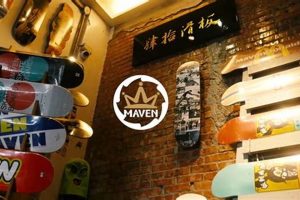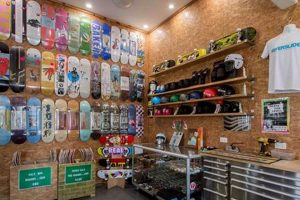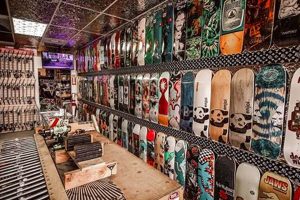A retail establishment focused on skateboarding equipment and apparel, this type of business caters to the needs of skateboarders and enthusiasts. It typically offers a range of products, including skateboards, components (wheels, trucks, bearings), protective gear (helmets, pads), and clothing associated with the skateboarding lifestyle. These businesses often serve as hubs for local skateboarding communities.
These establishments are important for several reasons. They provide specialized products and expert advice not commonly found in general sporting goods stores. They also often foster a sense of community by sponsoring local skaters, hosting events, and providing a gathering place for individuals passionate about skateboarding. Historically, they have played a significant role in the development and promotion of skateboarding culture.
The following discussion will delve into various aspects of these specialized retail spaces, exploring their role in the broader context of the skateboarding industry, including retail strategies, community engagement, and the impact of online commerce.
Essential Guidance for Selecting a Skateboarding Retailer
The following guidelines offer crucial insights for consumers seeking a reputable skateboarding retailer. Adherence to these recommendations facilitates informed purchasing decisions and a positive customer experience.
Tip 1: Evaluate Product Diversity. A comprehensive retailer will stock a wide array of skateboard decks, components (wheels, trucks, bearings), and safety equipment from established brands. This variety allows customers to find equipment suited to their individual needs and skill levels.
Tip 2: Scrutinize Product Quality. Prioritize retailers that carry products manufactured with durable materials and precision engineering. Check for recognized industry certifications and read product reviews to assess quality and reliability.
Tip 3: Assess Staff Expertise. The ideal retailer employs staff with in-depth knowledge of skateboarding equipment and techniques. Their ability to provide informed recommendations and assistance in equipment selection is invaluable.
Tip 4: Consider Community Involvement. A retailer actively engaged with the local skateboarding community often indicates a genuine passion for the sport and a commitment to customer satisfaction. Look for retailers that sponsor local events or support local skaters.
Tip 5: Analyze Pricing Strategies. While price should not be the sole determinant, competitive pricing is an important consideration. Compare prices across multiple retailers to ensure a fair value proposition. Be wary of excessively low prices, which may indicate counterfeit or substandard products.
Tip 6: Examine the Return Policy. Before making a purchase, understand the retailer’s return policy. A flexible and reasonable return policy provides assurance in the event of product defects or dissatisfaction.
Careful consideration of these factors will contribute to a well-informed decision when selecting a skateboarding retailer. This approach optimizes the likelihood of acquiring quality equipment and receiving knowledgeable service.
Subsequent sections of this article will address related topics, including the evolving retail landscape and emerging trends within the skateboarding industry.
1. Product Variety
The availability of a diverse product range is a defining characteristic of a skateboarding retail business, significantly influencing its ability to serve the varied needs and preferences of the skateboarding community.
- Skateboard Decks: Shapes, Sizes, and Materials
These retail spaces stock decks in various shapes (e.g., popsicle, cruiser, old-school), sizes (ranging from narrow for technical street skating to wider for stability), and materials (typically maple, but also incorporating carbon fiber or composites for added strength and responsiveness). The selection reflects the diverse styles and performance requirements of skateboarders.
- Components: Trucks, Wheels, Bearings, and Hardware
Each component category contributes uniquely to the skateboarding experience. The stores offer trucks of different widths and heights to match deck size and riding style. Wheels vary in diameter, durometer (hardness), and shape to cater to different terrains and techniques. Bearings are available in various precision grades, impacting speed and smoothness. Hardware options include different lengths and head types to accommodate varying deck and truck combinations. These granular choices enable highly customized setups.
- Protective Gear: Helmets, Pads, and Guards
Prioritizing safety, these retailers provide helmets conforming to safety standards (e.g., ASTM F1492). Pads for knees, elbows, and wrists offer impact protection, available in various sizes and materials. Mouthguards and other specialized protective equipment are also stocked to address specific risk factors associated with skateboarding.
- Apparel and Footwear: Function and Fashion
Beyond equipment, these businesses offer specialized skateboarding shoes with reinforced construction, grippy soles, and durable materials. Clothing lines designed for skateboarding emphasize comfort, mobility, and durability. The integration of performance-oriented apparel and footwear enhances the overall skateboarding experience.
The breadth of products available in skateboarding retail reflects the complex demands of the sport. This curated selection enables skateboarders of all levels to find equipment suited to their unique needs, contributing to their progression and enjoyment.
2. Community Hub
The role of a skateboarding retail location as a community hub is integral to its function and influence. These spaces serve as focal points for skateboarders, fostering social interaction, knowledge sharing, and a sense of belonging. The physical store becomes more than just a point of sale; it transforms into a gathering place where individuals with shared interests can connect. For example, a location may host weekly skate sessions or workshops, inviting local skaters to enhance their skills and connect with fellow enthusiasts.
These hubs provide essential support networks for skaters, especially for those new to the sport. Experienced skaters often share tips and techniques, creating a learning environment that extends beyond formal instruction. Furthermore, they frequently sponsor local skate teams and events, contributing to the visibility and growth of the skateboarding scene. In practical terms, this community focus translates to increased customer loyalty, positive word-of-mouth referrals, and a strengthened connection between the retail business and its target demographic. They also cultivate a sense of brand loyalty, as customers tend to support businesses that actively invest in their community.
In conclusion, understanding the community hub aspect of skateboarding retail is essential for appreciating the full scope of these establishments. Challenges exist in maintaining genuine community engagement, particularly in an increasingly digital landscape. However, the ability to cultivate a strong community presence remains a key differentiator and a significant driver of success for businesses in this sector.
3. Expert Consultation
Expert consultation within a skateboarding retail setting directly influences customer satisfaction and safety. Skateboarders, particularly novices, often lack the knowledge to select appropriate equipment for their skill level and intended use. This gap in knowledge necessitates informed guidance from staff. For instance, a staff member might advise a beginner against purchasing a deck designed for advanced technical tricks, recommending a more stable and forgiving setup instead. The absence of such guidance can lead to unsuitable equipment choices, increasing the risk of injury and hindering the skater’s progression.
The availability of expert consultation also fosters trust and loyalty. When staff members demonstrate a genuine understanding of skateboarding equipment and techniques, customers are more likely to perceive the establishment as a reliable source of information. Consider a scenario where a skater seeks advice on upgrading their bearings for increased speed. A knowledgeable staff member can explain the nuances of different bearing types (e.g., ABEC ratings, materials) and recommend specific products based on the skater’s riding style and budget. This personalized service enhances the customer experience and increases the likelihood of repeat business. Furthermore, a strong consultation process can mitigate the potential for returns and exchanges, saving the retailer time and resources.
In summation, expert consultation is a crucial element of a successful skateboarding retail business. It addresses the inherent knowledge gap among customers, promotes safety, builds trust, and drives customer loyalty. While challenges exist in maintaining a consistently high level of expertise among staff, the benefits of providing informed guidance far outweigh the costs. The provision of expert consultation directly contributes to the overall health and sustainability of a specialized retail environment.
4. Retail Atmosphere
The retail atmosphere of a skateboarding business directly influences consumer behavior and perception. The physical environment of these locations often serves as a tangible representation of the skateboarding culture, impacting customer engagement and purchase decisions. A skate shop’s design, layout, music, and even scent contribute to a sensory experience that either reinforces or detracts from the brand’s identity. For example, a business featuring raw, industrial aesthetics, skateboard-themed artwork, and the sounds of skate videos creates an immersive environment that resonates with skateboarding enthusiasts. This environment distinguishes it from generic sporting goods stores. Consider the contrast between this type of retail location and a brightly lit, sterile environment devoid of skateboarding-specific visual cues. The former cultivates a sense of belonging, while the latter may fail to connect with the target demographic.
The careful curation of the retail atmosphere is not merely an aesthetic choice; it is a strategic element impacting sales, customer loyalty, and brand recognition. A positive atmosphere encourages customers to spend more time browsing, interacting with staff, and ultimately making purchases. Furthermore, a memorable and engaging atmosphere strengthens brand recall and fosters a sense of connection between the customer and the skateboarding culture. Some retail spaces extend their atmosphere beyond the purely visual, incorporating interactive elements such as mini-ramps or video game consoles to create a more immersive and engaging experience. These approaches aim to transcend the transactional nature of retail, transforming the shopping experience into a social event.
In conclusion, the atmosphere of a skateboarding retail location is a critical, often underestimated, component of its overall success. Businesses that prioritize the creation of an authentic and engaging environment are more likely to attract and retain customers, foster a sense of community, and ultimately thrive in a competitive market. The investment in a well-considered retail atmosphere is an investment in the long-term sustainability and brand equity of the enterprise. This aspect requires continuous attention and adaptation to maintain relevance and resonance with the evolving skateboarding culture.
5. Brand Authenticity
In the context of a skateboarding retail business, the concept of brand authenticity directly correlates with consumer trust and long-term viability. A perception of genuineness regarding the products offered, the staff’s expertise, and the business’s overall connection to skateboarding culture influences purchasing decisions. For instance, a retail location that stocks only products from established skateboarding brands, employs staff who are active skateboarders, and supports local skateboarding events cultivates a strong perception of authenticity. Conversely, a business that offers generic products, lacks knowledgeable staff, and demonstrates minimal engagement with the local scene risks appearing inauthentic, thereby alienating its target demographic.
Brand authenticity impacts several critical aspects of a skateboarding retail location. Firstly, it fosters consumer trust. Skateboarders are often discerning consumers who value quality and performance. A perception of authenticity assures them that the products they are purchasing are genuine and reliable. Secondly, it drives customer loyalty. Skateboarders are more likely to patronize businesses that they perceive as authentic and supportive of the skateboarding community. A real-world example is the numerous skateboard businesses which cultivate a distinct culture that sets them apart from conventional retailers. Thirdly, it enhances brand reputation. A skateboarding retail business renowned for its authenticity attracts positive word-of-mouth referrals and enjoys a competitive advantage in the market. Practical applications of this understanding involve actively engaging with and supporting the local skateboarding community through event sponsorships and collaborations with local skaters. Another important element for this business model is the importance of staffing the store with informed or experienced salespeople to ensure that consumers are getting the correct information for their individual needs.
In conclusion, brand authenticity is not merely a marketing buzzword for retail businesses specializing in skateboarding; it is a fundamental element of their success. While maintaining authenticity requires a consistent commitment to quality, community engagement, and a genuine passion for skateboarding, the long-term benefits are undeniable. Challenges lie in resisting the temptation to compromise authenticity for short-term gains, particularly as the skateboarding industry evolves and becomes increasingly commercialized. However, businesses that prioritize authenticity are best positioned to thrive in a dynamic and competitive market.
Frequently Asked Questions
The following addresses common inquiries concerning establishments specializing in skateboarding retail. These questions are answered with the aim of providing clarity and comprehensive information.
Question 1: What distinguishes a skateboarding retail establishment from a general sporting goods store?
The primary distinction lies in specialization. These establishments focus exclusively on skateboarding-related equipment and apparel. General sporting goods stores offer a wider range of products across various sports, typically lacking the depth of expertise and product variety specific to skateboarding.
Question 2: How crucial is staff expertise within a skateboarding retail context?
Staff expertise is paramount. Skateboarders, particularly beginners, often require guidance on equipment selection, safety, and maintenance. Knowledgeable staff can provide tailored recommendations, enhancing the customer experience and promoting safe skateboarding practices.
Question 3: What role does the retail environment play in attracting and retaining customers?
The retail environment significantly influences customer perception. A skateboarding retail establishment that reflects the culture through its design, music, and visual elements creates a more engaging and authentic experience, fostering customer loyalty.
Question 4: How does a skateboarding retail location contribute to the local skateboarding community?
These businesses often serve as community hubs by sponsoring local skaters, hosting events, and providing a gathering place for enthusiasts. This involvement strengthens the local skateboarding scene and enhances the retailer’s reputation.
Question 5: What are the key factors in evaluating the quality of skateboarding equipment?
Factors include materials, construction, and adherence to safety standards. Reputable brands generally prioritize quality and durability. Product reviews and industry certifications can provide additional insights into equipment performance.
Question 6: What is the significance of brand authenticity in skateboarding retail?
Brand authenticity is crucial for building trust with consumers. Skateboarders value genuineness and are more likely to patronize businesses that demonstrate a genuine commitment to the skateboarding culture.
In summary, skateboarding retail establishments play a vital role in providing specialized equipment, expert advice, and community support to skateboarders. Their success hinges on factors such as product quality, staff expertise, retail environment, and brand authenticity.
The next section will delve into the economic landscape of skateboarding retail and its influence on skateboarding communities.
Concluding Remarks
This analysis has explored the multidimensional nature of a “pop skate shop,” emphasizing its function beyond a mere retail outlet. The examination has spanned product variety, community engagement, expert consultation, retail atmosphere, and brand authenticity. These elements coalesce to define the overall significance and impact of this type of business within the skateboarding ecosystem.
As the skateboarding industry continues to evolve, the role of the specialized retail space remains vital. Sustaining a commitment to core values, fostering authentic connections, and adapting to emerging trends will determine the enduring success and relevance of these establishments. This necessitates ongoing evaluation and strategic adjustments to meet the ever-changing needs of the skateboarding community.







